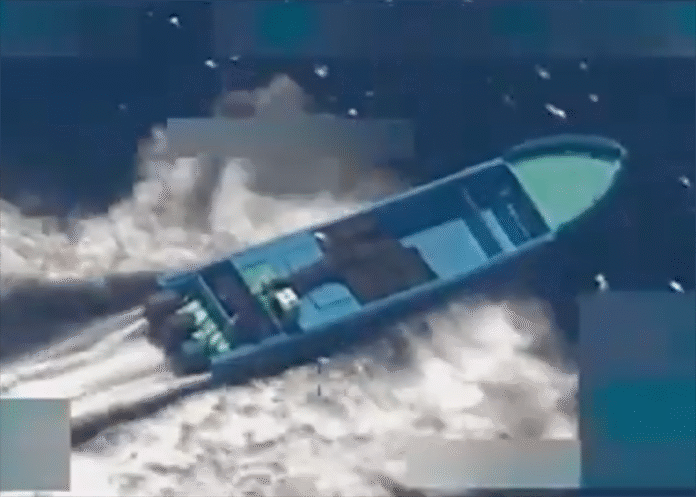The United States said it destroyed a vessel carrying narcotics in the eastern Pacific Ocean on Tuesday, killing two people it described as “narco-terrorists,” in what marks the first U.S. military strike away from Caribbean waters under President Donald Trump’s expanding campaign against drug trafficking groups.
“Yesterday, at the direction of President Trump, the Department of War conducted a lethal kinetic strike on a vessel being operated by a Designated Terrorist Organization,” said U.S. Secretary of War Pete Hegseth in a statement. He added that the strike was carried out in international waters, causing no U.S. casualties.
According to Secretary Hegseth, the targeted vessel was transiting a “known narco-trafficking route” and carried illicit drugs destined for the United States. “Narco-terrorists intending to bring poison to our shores will find no safe harbor anywhere in our hemisphere,” he said. “Just as Al Qaeda waged war on our homeland, these cartels are waging war on our border and our people. There will be no refuge or forgiveness—only justice.”
The Pentagon has not disclosed the location or the name of the organization linked to the destroyed vessel. Given that Venezuela only has a Caribbean coast, the four-engine fast boat most likely departed one of Colombia’s many ports along the Pacific litoral.
The most recent operation comes amid heightened U.S. military activity in Latin American waters. U.S. air strikes have already destroyed at least seven boats allegedly transporting narcotics from Venezuela and Colombia through international waters. Trump has also authorized covert operations in Venezuela by signing a “finding,” or executive order, allowing the CIA to conduct special activities in the country.
A report in the Washington Post titled “Trump beats the drums of war for direct action in Venezuela,” claims that the maritime strategy may go beyond targeting fast boats, as President Trump wants “to stop them by land” within Venezuelan territory.
Officials familiar with internal discussions said any potential land incursion would likely focus on alleged trafficker encampments or clandestine airstrips, not on an outright attempt to remove Maduro from power. Analysts, however, have warned that the military buildup risks escalating tensions across the region.
Republican Senator Bernie Moreno of Ohio, one of the administration’s most vocal supporters, said the operation demonstrates what he calls “the Trump Doctrine.”
“The Americas will be liberated from deadly illegal drugs, the cartels that traffic them, and the corrupt politicians that enable and profit from this activity,” Moreno said in a statement.
Moreno also criticized Colombian President Gustavo Petro, accusing him of “appeasement” toward armed groups. “Petro talks about peace when, in reality, he’s promoting the appeasement of criminals who have killed thousands of his own citizens,” he said. “Colombia deserves a leader that lifts the lives of its people, not the welfare of narco-terrorists.”
The Senator added that the United States “stands with the people of Colombia as it has for 200 years” and suggested that bilateral relations would “rejoin” once the Petro administration ends.
Trump’s hardline approach to anti-narcotics operations marks a sharp shift from previous U.S. policy, which emphasized multilateral cooperation and intelligence sharing with Latin American governments. His administration has recast the fight against drug cartels as part of a broader “war on terror” framework, enabling the use of military force outside U.S. borders.
Officials have compared the current campaign to counterterrorism operations in the Middle East, though the legal and diplomatic implications of targeting suspected traffickers in international waters remain unclear.
Neither the Colombian government nor the Venezuelan regime has formally responded to the latest U.S. strike. Human rights organizations have raised concerns about potential violations of international law, warning that labeling criminal actors as “terrorists” could blur the lines between law enforcement and armed conflict.
Despite criticism, the White House insists that the campaign enjoys broad domestic support. “These cartels are not just criminal organizations,” Hegseth said. “They are enemies of the United States, and we will treat them as such.”

